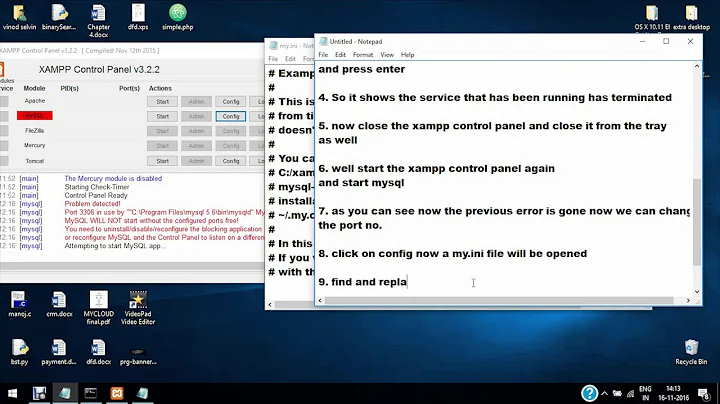MYSQLi error: User already has more than 'max_user_connections' active connections
Solution 1
Probably the problem is that you have only a handful connections allowed and when your class tries to get a new connection you have this error.
This is not a programming problem, just quantity of resources available. And any other script that uses this class are subject to have the error.
You have to configure more connections on mysql config file on the server. If you don't have this access, ask the support to do it or change for a hosting company with more connections allowed!
Other option is to implement a Singleton pattern on this class, so it reuses same pool of connections, and don't explode the limit.
Solution 2
Check the MAX USER_CONNECTIONS setting on your MySQL server for the user. In PHPMyAdmin go to the server page (Click on the Server:<>) and in the sub-menu click on priviledges. Edit the user dbo343879423 and the MAX USER_CONNECTIONS will be on the right side. By default I believe it is set to 0 (unlimited), yours maybe restricted depending on who setup the server.
I'm not sure how your Database class is being used but if you are instantiating the class multiple times consider creating a private static variable Database in the database class and creating a public static method getDatabase() which instantiates the database connection if it is null and returns the instance.
Solution 3
If you get this max_user_connections message first optimize your database table.
How to optimize database table and query:
- Index your table field in mysql
- In select query remove `*` and write which you need field
- Closed mysql_connection
Solution 4
to check numbers of connection login to mysql using command line and run this command
SHOW VARIABLES LIKE 'max_user_connections'
STEP #1 : Look setting in /etc/my.cnf
max_user_connections = <set number that you want>
max_user_connections =
you can set from mysql command line too
SET GLOBAL max_user_connections = 0;
restart your apache server
Solution 5
For this on Godaddy shared hosting, you cant change the MAX_USER_CONNECTION value. To find it, click Server<>, then click Variables in the menu-bar. Mine is set to 200.
Related videos on Youtube
Comments
-
Run over 2 years
I have this error below on a site I am running. I don't understand why is that as it works fine on my localhost. Is it something to do with the host? I am on an Unix server.
Warning: mysqli::mysqli() [mysqli.mysqli]: (42000/1203): User dbo343879423 already has more than 'max_user_connections' active connections in /homepages/9/d322397966/htdocs/dump/models/class_database.php on line 11 Connect failed: User dbo343879423 already has more than 'max_user_connections' active connections Warning: mysqli::close() [mysqli.close]: Couldn't fetch mysqli in /homepages/9/d322397966/htdocs/dump/models/class_database.php on line 160the error says 'User dbo343879423 already has more than 'max_user_connections' active connections in /homepages/9/d322397966/htdocs/dump/models/class_database.php on line 11', so this is the line 11 in the script - I can't see anything wrong!
$this -> connection = new mysqli($hostname,$username,$password,$database);below is the entire class in class_database.php, is it wrong in other part of script and I should change?
<?php #connects the database and handling the result class __database { protected $connection = null; protected $error = null; #make a connection public function __construct($hostname,$username,$password,$database) { $this -> connection = new mysqli($hostname,$username,$password,$database); if (mysqli_connect_errno()) { printf("Connect failed: %s\n", mysqli_connect_error()); exit(); } } #fetches all result rows as an associative array, a numeric array, or both public function fetch_all($query) { $result = $this -> connection -> query($query); if($result) { return $result -> fetch_all(MYSQLI_ASSOC); } else { $this -> error = $this -> connection -> error; return false; } } #fetches a result row as an associative array, a numeric array, or both public function fetch_assoc_while($query) { $result = $this -> connection -> query($query); if($result) { while($row = $result -> fetch_assoc()) { $return_this[] = $row; } if (isset($return_this)) { return $return_this; } else { return false; } } else { $this -> error = $this -> connection -> error; return false; } } #fetch a result row as an associative array public function fetch_assoc($query) { $result = $this -> connection -> query($query); if($result) { return $result -> fetch_assoc(); } else { $this -> error = $this -> connection -> error; return false; } } #get a result row as an enumerated array public function fetch_row($query) { $result = $this -> connection -> query($query); if($result) { return $result -> fetch_row(); } else { $this -> error = $this -> connection -> error; return false; } } #get the number of rows in a result public function num_rows($query) { $result = $this -> connection -> query($query); if($result) { return $result -> num_rows; } else { $this -> error = $this -> connection -> error; return false; } } #performs a query on the database public function query($query) { $result = $this -> connection -> query($query); if($result) { return $result; } else { $this -> error = $this -> connection -> error; return false; } } #escapes special characters in a string for use in a SQL statement, taking into account the current charset of the connection public function real_escape_string($string) { $result = $this -> connection -> real_escape_string($string); if($result) { return $result; } else { $this -> error = $this -> connection -> error; return false; } } #display error public function get_error() { return $this -> error; } #closes the database connection when object is destroyed. public function __destruct() { $this -> connection -> close(); } } ?>or should I just change the host for good!??
below is the implementation of the database connection class. If I take this part out, the error won't appear anymore, but I do the same at other parts of the site as well and they won't cause any problem!
<!-- side-video-library --> <div id="side-video-library" class="round-corner"> <h4><a href="<?php echo HTTP_ROOT;?>videos"><span>ENER VIDEO LIBRARY</span></a></h4> <?php $sql = " SELECT * FROM root_pages WHERE root_pages.parent_id = '8' AND root_pages.pg_highlight = '1' AND root_pages.pg_hide != '1' ORDER BY rand() DESC LIMIT 1 "; #instantiate the object of __database class $object_item = new __database(DB_HOST,DB_USER,DB_PASS,DB_NAME); $item = $object_item -> fetch_assoc($sql); #instantiate the object of __database class $object_item_num = new __database(DB_HOST,DB_USER,DB_PASS,DB_NAME); $total_item = $object_item_num -> num_rows($sql); //echo $total_item; ?> <?php if ($total_item > 0) { $sql = " SELECT * FROM root_tagged LEFT JOIN root_tags ON ( root_tags.tag_id = root_tagged.tag_id ) WHERE root_tagged.pg_id = '".$item['pg_id']."' "; #instantiate the object of __database class $object_tagname = new __database(DB_HOST,DB_USER,DB_PASS,DB_NAME); $item_tagname = $object_tagname -> fetch_assoc($sql); #instantiate the object of __database class $object_tagname_num = new __database(DB_HOST,DB_USER,DB_PASS,DB_NAME); $total_tagname = $object_tagname_num -> num_rows($sql); ?> <p class="item-video"> <object style="width: 183px; height: 151px;" width="183" height="151" data="http://www.youtube.com/v/<?php echo get_video_id($item['pg_content_1']) ;?>" type="application/x-shockwave-flash"> <param name="wmode" value="transparent" /> <param name="src" value="http://www.youtube.com/v/<?php echo get_video_id($item['pg_content_1']) ;?>" /> </object> </p> <h3><a href="<?php echo HTTP_ROOT.str_replace(' ', '-', 'videos').'/'.$item_tagname['tag_name'].'/'.str_replace(' ', '-', strtolower($item['pg_url']));?>"><?php if(strlen($item['pg_title']) > 20) echo substr($item['pg_title'], 0,20).'...'; else echo $item['pg_title'];?></a></h3> <p class="item-excerpt-video"><?php if(strlen($item['pg_content_2']) > 100) echo substr($item['pg_content_2'], 0,100).'...'; else echo $item['pg_content_2'];?></p> <a href="<?php echo HTTP_ROOT;?>videos" class="button-arrow"><span>More</span></a> <?php } ?> </div> <!-- side-video-library -->Have I been implementing the class incorrectly??
thanks.
-
Brian Driscoll over 13 yearswhat version of PHP is your host using? Destructors are only supported as of PHP5
-
Fernando Barrocal over 13 yearsI am not confident on GC's ... invoke destruct by hand when finished using the class
-
Jahmic about 3 yearsThis is not the same question as the supposed duplicate, especially when some of the solution discuss increasing the potential active connections available.
-
-
Run over 13 yearsthanks for the reply. how do I 'implement a Singleton pattern on this class, so it reuses same pool of connections, and don't explode the limit'? thanks!
-
Run over 13 yearshi thanks for the reply. I just edited my OP thread above, adding in the part where how I use the database connection class - have I been practising it incorrectly?? thanks
-
Fernando Barrocal over 13 yearsGive a look at odi.ch/prog/design/singleton.php on how to implement. On other hand there are plenty of PHP Connection pools around
-
Alex Hadley over 11 yearsYou can also set the values in my.cnf: [mysqld] max_connections = 500 max_user_connections = 200
-
Tycon over 9 yearsI did a little more testing. My observation is that PDO seems to be less tolerate of many consecutive connections - that is connections being created in a loop. I know this is bad practice it the first place. When I was using mysql_* my looped queries seemed to be reasonably fast. However when I switched to PDO I noticed much longer response times for these types of queries. TL;DR; - If you switch to PDO and you call queries in a PHP loop you may need to rewrite the application to call one single query rather than many consecutive queries.
-
 Heitor almost 6 yearsCould you explain WHY we need first optimize the database table??
Heitor almost 6 yearsCould you explain WHY we need first optimize the database table?? -
 Gellie Ann almost 3 yearsI tried editing the field via the
Gellie Ann almost 3 yearsI tried editing the field via theVariablestoo but I encounter a#1227 - Access deniederror. Do you have an idea on how to fix this?

![Can't connect to mysql server [solution] error 2003, 'localhost'(10061) from MySQL Workbench](https://i.ytimg.com/vi/GBGDoh1H0aQ/hq720.jpg?sqp=-oaymwEcCNAFEJQDSFXyq4qpAw4IARUAAIhCGAFwAcABBg==&rs=AOn4CLA0kd7IcfTr8gBd2OoBn8h6HSNMog)

![[Solved] Error: MySql Shutdown Unexpectedly [2022 Update] MySql not starting in Xampp Server](https://i.ytimg.com/vi/ipMedkjMupw/hq720.jpg?sqp=-oaymwEcCNAFEJQDSFXyq4qpAw4IARUAAIhCGAFwAcABBg==&rs=AOn4CLD2fnp0piaMes-oNEX_ppbCrd3DZQ)

: Access denied for user 'pma'@'localhost' (using password: YES) | phpmyadmin](https://i.ytimg.com/vi/dLSkIyTBU7I/hq720.jpg?sqp=-oaymwEcCNAFEJQDSFXyq4qpAw4IARUAAIhCGAFwAcABBg==&rs=AOn4CLD06gEcFA8cT-33gEyiPmNwJK7WWw)

![[SOLVED] SQLSTATE ProxySQL Error: Access denied for user 'root'@'2a02:4' (using password: YES or NO)](https://i.ytimg.com/vi/QQszibLCCL8/hq720.jpg?sqp=-oaymwEcCNAFEJQDSFXyq4qpAw4IARUAAIhCGAFwAcABBg==&rs=AOn4CLCjMnGhw_Q5T8vDV6Fr_oNhh4STIw)

